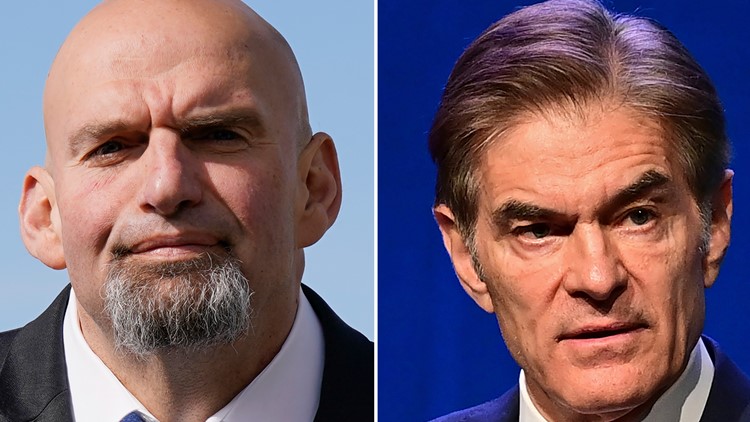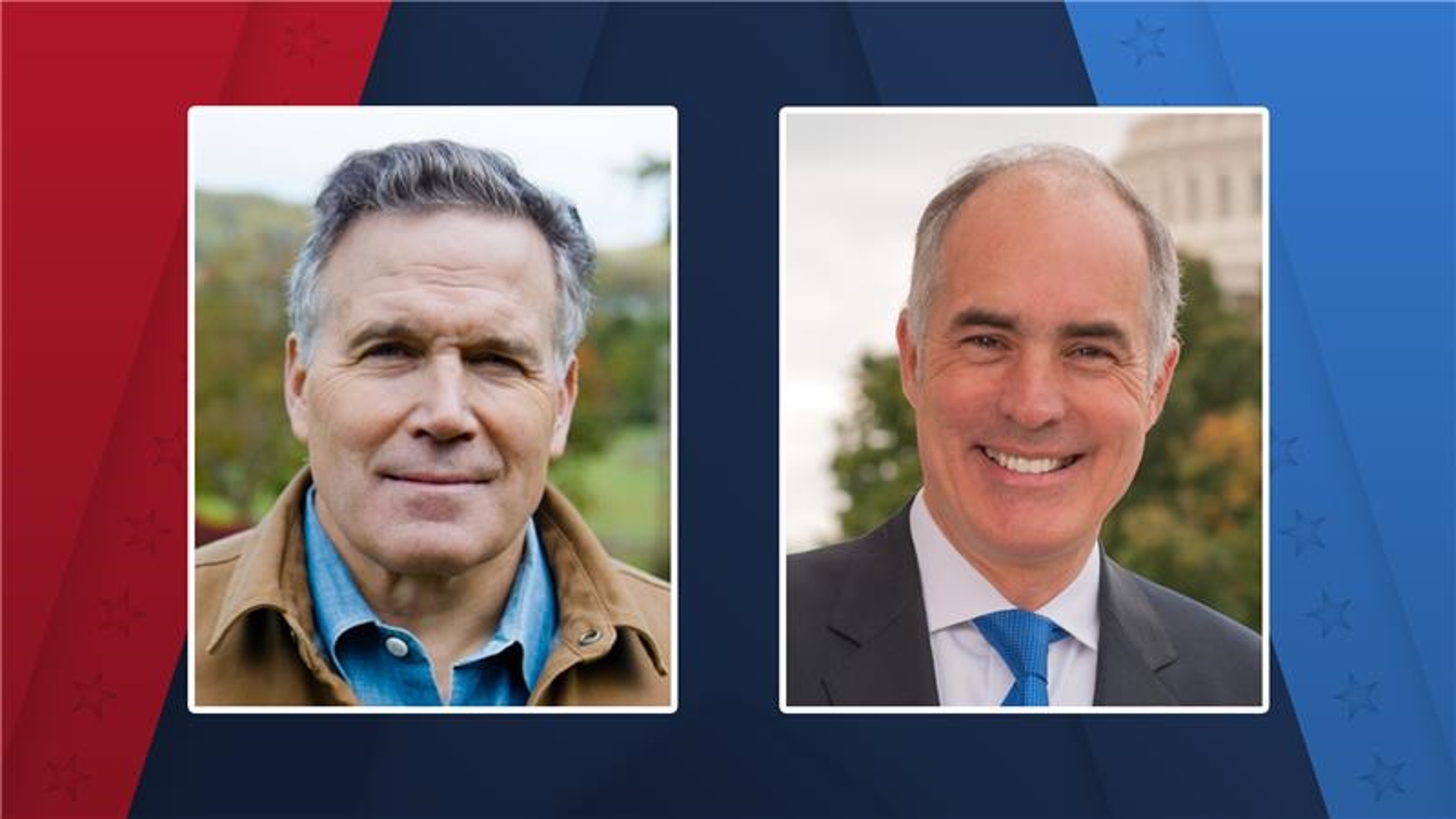HARRISBURG, Pa. — Pennsylvania Democrat John Fetterman wouldn’t commit to releasing his full medical records during a highly anticipated debate against Republican Mehmet Oz on Tuesday, speaking haltingly throughout the hourlong event more than five months after experiencing a stroke.
Fetterman, Pennsylvania's 53-year-old lieutenant governor, has acknowledged that he “almost died" after suffering a stroke in May. On Tuesday night, he addressed what he called the “elephant in the room."
“I had a stroke. He’s never let me forget that,” Fetterman said of his Republican opponent. “And I might miss some words during this debate, mush two words together, but it knocked me down and I’m going to keep coming back up.”
He also quickly tried to go on offense by attacking Oz's “gigantic mansions” and his integrity.
“It’s the Oz rule: he’s on TV and he’s lying," Fetterman said.
Oz, a celebrity heart surgeon, ignored his opponent's health throughout the debate, though he has hammered Fetterman on the issue repeatedly during the campaign. On Tuesday night, Oz attacked Fetterman's policies on crime, saying he is “trying to get as many murderers out of jail as possible.”
"These radical positions extend beyond crime," Oz charged. He later added, “His extreme positions have made him untenable.”
Fetterman insisted he is prepared for the demands of the Senate as he continues to recover from the stroke. Independent experts consulted by The Associated Press said he appears to be recovering remarkably well. He used closed-captioning during the debate to help him process the words he hears.
Stroke rehabilitation specialist Dr. Sonia Sheth, who watched the debate, called Fetterman an inspiration to stroke survivors.
“In my opinion, he did very well,” said Sheth of Northwestern Medicine Marianjoy Rehabilitation Hospital in suburban Chicago. “He had his stroke less than one year ago and will continue to recover over the next year. He had some errors in his responses, but overall he was able to formulate fluent, thoughtful answers.”
Problems with auditory processing do not mean someone also has cognitive problems, the experts agreed. The brain’s language network is different from regions involved in decision making and critical thinking.
While debates have rarely swayed elections in the modern era, the intense national interest in the primetime affair -- particularly in Fetterman’s performance -- suggested this debate could prove decisive in an election central to the Democrats’ urgent fight to retain their Senate majority.
For Democrats, there is no better pickup opportunity in the U.S. than the race to replace retiring Republican Sen. Pat Toomey in a state Biden narrowly carried in 2020.
For much of the year, it looked as if Fetterman was the clear favorite, especially as Republicans waged a nasty nomination battle that left the GOP divided and bitter. But as Election Day nears, the race has tightened. And now, just two weeks before the final votes are cast, even the White House is privately concerned that Fetterman’s candidacy is at risk.
Voting is already well underway across the state. As of Tuesday, 639,000 votes had already been cast.
Fetterman’s speech challenges were apparent throughout the night. He often struggled to complete sentences.
When pressed to explain his shifting position on fracking, his answer was particularly awkward.
“I do support fracking. And I don’t, I don’t. I support fracking, and I stand and I do support fracking,” he said.
At another point, the moderator seemed to cut off Fetterman as he struggled to finish an answer defending Biden’s student loan debt forgiveness programs. He also stumbled before finishing a key attack line: “We need to make sure that Dr. Oz and Republicans believe in cutting Medicare and Social Security ...”
The Pennsylvania Senate hopefuls faced each other inside a Harrisburg television studio. No audience was allowed, and the debate host, Nexstar Media, declined to allow an AP photographer access to the event.
The meeting was the first and only major statewide debate this year in Pennsylvania, since Democrat Josh Shapiro and Republican Doug Mastriano couldn’t reach an agreement on terms for a gubernatorial debate.
Fetterman is a star in progressive politics nationwide, having developed a loyal following thanks in part to his blunt working-class appeal, extraordinary height, tattoos and unapologetic progressive policies. On Tuesday, the 6-foot-9-inch Democrat swapped his trademark hoodie and shorts for a dark suit and tie.
But Fetterman's health has emerged as a central issue over the election's final weeks, even as candidates elsewhere clash over issues like abortion, crime and inflation.
Oz had pushed for more than a half-dozen debates, suggesting that Fetterman's unwillingness to agree to more than one is because the stroke had debilitated him. Fetterman insisted that one debate is typical — although two is more customary — and that Oz's focus on debates was a cynical ploy to lie about his health.
Democrats noted that the televised debate setting likely would have favored Oz even without questions about the stroke.
Oz is a longtime television personality who hosted “The Dr. Oz Show” weekdays for 13 seasons after getting his start as a regular guest on Oprah Winfrey’s show in 2004. Fetterman, by contrast, is a less practiced public speaker who is introverted by nature.
“This was always going to be an away game for John Fetterman,” said Mustafa Rashed, a Democratic political consultant based in Philadelphia.
Fetterman asked for, and was granted, a closed-captioning system for the debate that displayed in writing everything said on a large screen behind the moderators.
The Fetterman campaign said in a memo ahead of the debate that the closed captioning would be “typed out by human beings in real time, on live TV,” warning that it could lead to time delays, transcription errors and miscommunication. “It is impossible to control and unavoidable,” the memo said.
Abortion was a major dividing line during the debate.
Oz insists he supports three exceptions — for rape, incest and to protect the life of the mother. When pressed on Tuesday night, he suggested he opposes South Carolina Sen. Lindsey Graham’s bill to impose a nationwide ban on abortion after 15 weeks because it would allow the federal government to dictate the law to states.
“I’m not going to support federal rules that block the ability of states to do what they wish to do,” Oz said.
Fetterman said he would vote for Democrats’ legislation in Congress to allow abortion for up to 24 weeks of pregnancy. He also has said separately that he does not support imposing restrictions on abortion and prefers to leave it to women to decide.
“I want to look into the face of every woman in Pennsylvania: If you believe the choice of your reproductive freedom belongs with Dr. Oz that’s your choice. But if you believe that the choice for abortion belongs with you and your doctor, that’s what I fight for,” Fetterman said.
Fetterman also raised questions about Oz’s residency, which has been a consistent theme throughout the campaign.
For much of the year, Fetterman has seized on Oz’s tenuous connections to the state in witty social media posts and media campaigns.
Oz was born in Ohio, was raised in Delaware and has lived in New Jersey for decades. In 2020, People magazine ran a feature on the New Jersey mansion that Oz and his wife Lisa “built from scratch 20 years ago.”
Later that year, Oz formally adopted a Pennsylvania address. And the next year, 2021, he launched his Senate campaign.
Meanwhile, questions about Fetterman’s physical and mental strength have persisted.
When pressed Tuesday night, Fetterman refused to say he would release his medical records.
“For me, transparency is about showing up,” he said.
Fetterman has consistently rebuffed calls to release medical records or let reporters question his doctors. Last week he released a note from his primary care physician, who wrote that Fetterman is recovering well, shows no cognitive effects and “can work full duty in public office.”
Fetterman’s campaign insists he is healthier than ever now that he is paying closer attention to his diet and daily exercise regimen of walking several miles a day. He is participating in regular sessions with a speech therapist and taking medication.
Fetterman sought to use his health challenges as a positive.
“My campaign is all about fighting for anyone in Pennsylvania that ever got knocked down,” he said.



